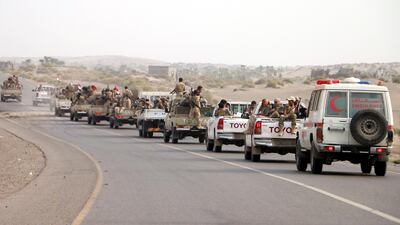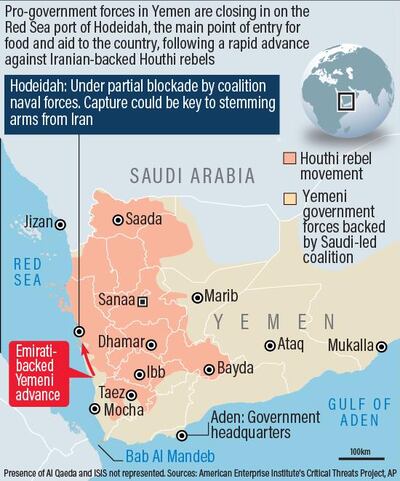The offensive on the Red Sea port of Hodeidah that began early yesterday morning marks the start of a turning point in the three-year conflict.
The battle for Yemen has been a war of conflicting narratives, with fronts drawn between government forces, Iranian-dominated militia, the ousted ruling party and entrenched Al Qaeda factions.
But for the advancing coalition-backed fighters, the struggle to control Hodeidah is a straight fight against the Tehran-backed Houthi militia.
Despite that, it will be a hot contest for the port on account of its impact on the flow of humanitarian aid to beleaguered parts of the country.
The Arab coalition has made assurances it will protect humanitarian access, and before the military route began it sought to avoid an assault by urging a Houthi withdrawal.
After sinking to a virtual stalemate midway through last year, the advance on Hodeidah has introduced a new dynamic into the battlefield and the prospects of a negotiated outcome.
For the moment, the Saudi-led coalition’s hope of drawing the raging civil war closer to an end rests on securing Hodeidah’s port, through which the Houthi rebels have been receiving weapons from Iran.
On Friday, the UAE issued an ultimatum for the Houthis to leave the port or the advance would begin. That deadline expired overnight Tuesday.
___________
Read more:
Yemen latest: Coalition forces launch Hodeidah operation — live updates
Arab coalition launches offensive on Yemen's rebel-held Hodeidah
Beyond the Headlines podcast: Dr Anwar Gargash on Iran, Yemen, Trump and more
___________
Coalition officials believe losing the port would be a decisive blow to the Houthis that would starve the group of a major source of funding and force them to the negotiating table.
They insist the longer Hodeidah stays in Houthi hands, the longer the war will persist.
The port that has played a critical role in financing the group’s insurgency across Yemen and activities that go beyond the embattled country’s borders, such as the firing of missiles into neighbouring Saudi Arabia.
"Hodeidah is considered the main source of income for the Houthis," Faizah Al Sulimani, a Yemeni entrepreneur and activist told The National.
“Losing Hodeidah means losing their main financial resource and also losing any access to any kind of aid. They will do anything to prevent the legitimate government from getting back in, even burning it to the ground.”
One of the first priorities for coalition forces at the start of the offensive is to secure the docks to stop them from being damaged. Reports from indicate that government and international forces were moving in from early yesterday to do that.
But Michael Knights, a fellow at the Washington Institute for Near East Policy, suggests that predictions of a drawn-out battle for the city underestimate the coalition’s capabilities and overestimate Houthi strength in the area.
"They [the coalition] would look at the Hodeidah area, and unlike humanitarians, they would separate it into areas that must be quickly secured, and areas that can be secured over a slower, longer-term basis. They aren't able to do everything in one-fell-swoop, even though the Houthi defences could collapse everywhere," he told The National.
"It is a city of 500,000 with 22,000 troops coming in from outside, and there's likely around 800 Houthis within the city, that would indicate there is a big possibility that Houthi control will crumble, just because they don't have the numbers to hold back the population itself any more," Mr Knights told The National.
Mr Knights suggested that the assault on the port did not mean an inevitable cutting of the humanitarian supply line.
“In terms of quickly securing the key facilities, the coalition has the capabilities to do that,” he said.
A last-minute diplomatic scramble was unable to prevent the assault on the port city. The Houthi rebels had very little to offer the coalition bar a wholesale withdrawal.
Analysts say the Houthis are an unreliable negotiating partner, at least in their current position.
“The Houthis have an abysmal track record of adhering to negotiations, or putting anything concrete or serious on the table” says Fatima Alasrar, Senior Analyst at the Arabia Foundation.
“They are quite unpredictable, in the past they have stated they are willing to negotiate, they seem to have agreed on terms provided, and when it came to signing they were not able to.”
The UK’s Department for International Development have warned charities and activists operating in the port city to make contingency plans for an imminent attack that could sever the port as a humanitarian artery. UN staff withdrew from the city in the days before the offensive.
Those warning against the assault are adamant that negotiations are the only way to bring Yemen’s war to an end. Others note that, in the past, the rebels have used negotiations to reposition their military forces and buy time when military pressure mounts.
But Mrs Alasrar said that the push on Hodeidah could force the Houthi leadership to the table and compel them to earnestly take part in the negotiation process.
“The Houthis will ultimately be part of the political process, there’s no way they cannot be,” she said. “They know the international community will offer that to them.
“Because of that, there hasn’t been any incentives for them to change their behaviour, because they know that ultimately they will be accommodated. The military offensive on Hodeidah is changing that.”
Mr Knights warned that: “The time for deciding not to resolve Hodeidah and kicking the can down the road is gone.
“Some are worried that goods won’t be able to come through the port, but that’s already happening. Commercial boats aren’t coming into the port and they won’t until this is resolved.
“There are two options: the Houthis leave or the Houthis get removed.”



